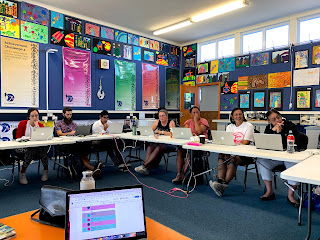I am grateful for the opportunity to participate in the Manaiakalani MIT programme. Although my project pace was moderate, it allowed me to explore how to support sporty students in achieving academic success, a long-term endeavour.
My project evolved from surveys and conversations to personal motivational posters, then to parallel sports-academic learning posters and reflections, ultimately leading to a digital sports-learning journal. This journal focuses on ownership, responsibility, and accountability, concepts inspired by Gilbert Enoka, the All Blacks Sports Psychologist.
The primary objective is to facilitate the transfer of athletic aptitude to academic learning, with the journals serving as a scaffold for academic success.
With the invaluable help of our mentor, Matt Goodwin, who helped create the parallel posters, I put together a journal for each sporting event/code for intermediate students. Sources of the content were from various junior athlete handbooks and sports diaries. In addition to this, are pages for the academic subjects for the sporty students to improve in: maths, writing and reading.
I anticipate co-constructing and refining these with students, teachers, coaches, and whānau. We have already implemented journals for Sports Camp, Netball, Rugby League, and Volleyball. Upcoming journals for Term 4 will cover Touch, Basketball, Cricket, and Athletics.
Scheduling dedicated time for students to engage with the journals and receive feedback is crucial for impacting their academic subject learning. Sharing their learning goals, strengths, and challenges with teachers, coaches, and whānau will further support their academic improvement.
My next step in 2026 is to begin a two-year study with a group of Year 7 "sporty ones" to analyse the journals' effectiveness.
Finally, I extend my huge, sincere thanks to Matt Goodwin and Dorothy Burt from Manaiakalani MIT Staff, and Justine Todd from KPMG, for their unwavering support throughout this journey. Fa'afetai, fa'afetai tele lava.
In summary, please find the links to the:
Parallel Posters & Sports-Learning Journal here: Pt England School Sports - Sporty Ones
Presentation slides here: Sporty Ones - Sally's Pecha Slides
 |
| QR code to 'Sporty Ones' |









